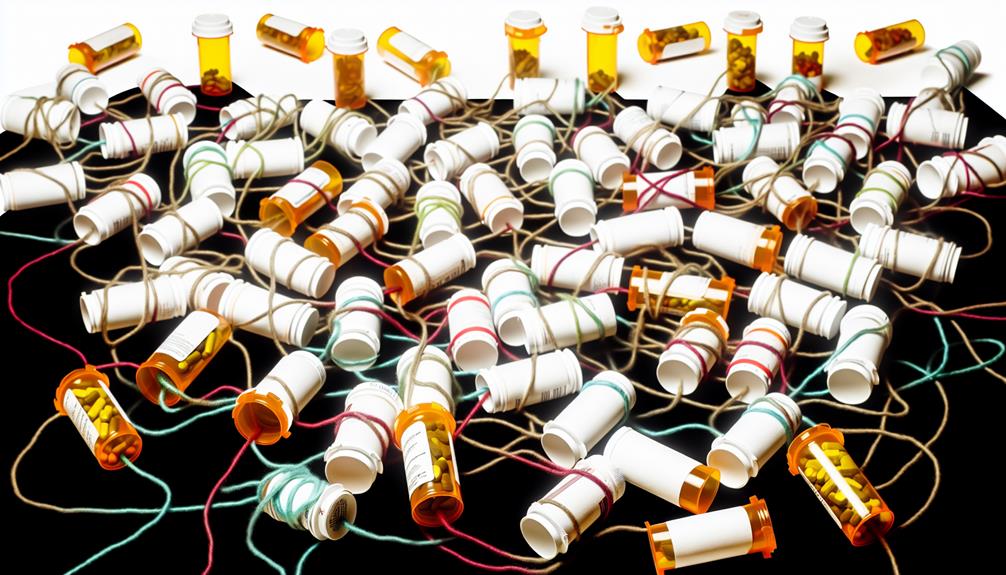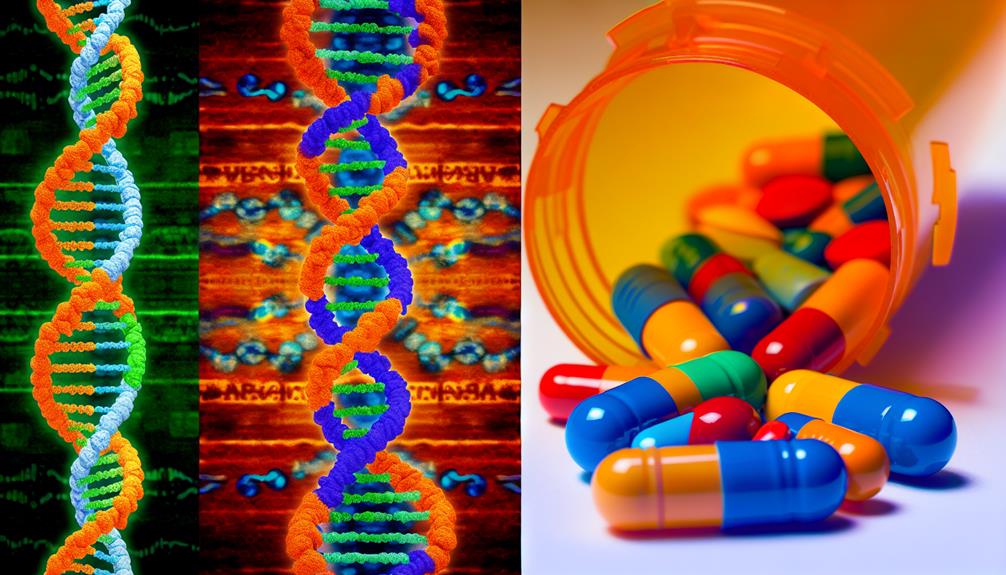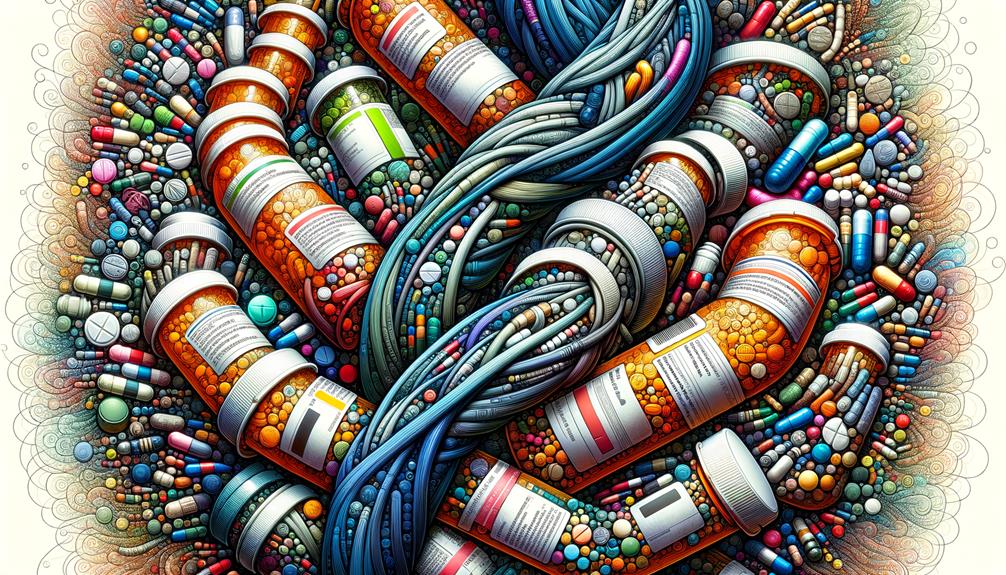So, you think you know everything there is to know about prescription drug addiction? Well, think again.
In this discussion, we will explore the six best strategies to understand this complex and often misunderstood issue.
From identifying risk factors and recognizing signs of abuse to examining the role of mental health and genetics, we will leave no stone unturned.
But that's not all.
We will also delve into the importance of building a comprehensive treatment plan.
So, buckle up and get ready to uncover the truth behind prescription drug addiction.
Understanding the Prescription Drug Epidemic

If you or someone you know has been affected by the prescription drug epidemic, it's important to understand the underlying factors that contribute to this widespread issue. Preventing addiction and providing community support are key in addressing this problem.
Prescription drug addiction often stems from a combination of factors. One major contributor is the overprescribing of medications by healthcare providers. Patients may receive larger quantities or stronger doses than necessary, leading to a higher risk of dependence. Additionally, the accessibility of prescription drugs through friends, family, or illegal channels can make it easier for individuals to obtain and misuse these medications.
To prevent addiction, it's crucial to educate healthcare professionals about responsible prescribing practices. By promoting alternative treatment options and closely monitoring patients' medication use, doctors can help reduce the risk of addiction. Furthermore, raising awareness among patients about the potential dangers of prescription drugs and the importance of proper usage can empower them to make informed decisions.
Community support is vital in combating prescription drug addiction. Creating support networks and resources for individuals struggling with addiction can provide them with the necessary guidance and encouragement to seek help. Additionally, community-based initiatives, such as prescription drug take-back programs and educational campaigns, can help raise awareness and promote responsible medication use.
Identifying Risk Factors for Addiction
To better understand prescription drug addiction, it's important to identify the risk factors that contribute to this pervasive issue. Risk assessment plays a crucial role in identifying individuals who are more susceptible to developing an addiction. Certain factors increase the likelihood of addiction, such as a personal or family history of substance abuse, mental health disorders, and a lack of social support. Additionally, individuals who've easy access to prescription drugs, whether through their own prescriptions or those of others, are at a higher risk. Other risk factors include age (adolescents and older adults are more vulnerable), a history of trauma or abuse, and a history of criminal behavior.
Prevention measures are essential in combatting prescription drug addiction. By understanding the risk factors, healthcare professionals and policymakers can develop targeted interventions and educational programs to mitigate these risks. Implementing prescription drug monitoring programs can help identify individuals who may be engaging in doctor shopping or obtaining multiple prescriptions from different providers. Promoting safe prescribing practices, such as limiting the quantity and duration of prescriptions, can also reduce the risk of addiction. Increasing public awareness about the dangers of prescription drug misuse and promoting alternative pain management strategies can further contribute to prevention efforts.
Recognizing the Signs of Prescription Drug Abuse

Recognizing the signs of prescription drug abuse is crucial in order to address this serious issue and provide help to those in need. It's important to be aware of the signs that may indicate someone is struggling with prescription drug abuse.
Here are five key signs to watch for:
- Drastic changes in behavior: If you notice that someone you know has experienced significant changes in their behavior, such as increased secrecy, mood swings, or irritability, it could be a sign of prescription drug abuse.
- Neglecting responsibilities: People who are struggling with prescription drug abuse often neglect their responsibilities at work, school, or home. They may start missing appointments, falling behind on their work, or neglecting their personal hygiene.
- Physical changes: Prescription drug abuse can lead to physical changes in appearance. Look out for signs like weight loss or gain, bloodshot eyes, or poor coordination.
- Financial difficulties: Prescription drugs can be expensive, and individuals struggling with abuse may experience financial difficulties. They may start borrowing money frequently or selling their belongings to support their habit.
- Withdrawal symptoms: If someone becomes agitated, restless, or experiences flu-like symptoms when they stop taking prescription drugs, it could be a sign of dependence and addiction.
Recognizing these signs is the first step towards intervention and providing the necessary help. If you notice these signs in yourself or someone you know, it's essential to seek professional assistance and support. Remember, addiction is a treatable condition, and early intervention can make a significant difference in someone's recovery journey.
Exploring the Role of Mental Health in Addiction
Understanding the connection between mental health and addiction is crucial in order to provide comprehensive support and treatment for individuals struggling with prescription drug abuse. Mental health stigma can often prevent individuals from seeking the help they need, as they may fear judgment or discrimination. It's important to recognize that addiction isn't a sign of weakness or moral failing, but rather a complex issue that can be influenced by various factors, including mental health.
When it comes to addressing prescription drug addiction, a dual diagnosis treatment approach is often recommended. This approach involves treating both the addiction and any co-occurring mental health disorders simultaneously. By addressing both aspects of an individual's health, the chances of successful recovery are greatly increased.
Dual diagnosis treatment recognizes that mental health and addiction are interconnected and that one can exacerbate the other. For example, individuals with mental health disorders may turn to prescription drugs as a means of self-medication, leading to addiction. Conversely, the prolonged use of prescription drugs can also contribute to the development or worsening of mental health disorders.
Examining the Impact of Genetics on Addiction

Genetics play a significant role in the development and progression of addiction, influencing an individual's susceptibility to prescription drug abuse. Understanding the impact of genetics on addiction is crucial in addressing the root causes and finding effective treatment strategies. Here are five important points to consider:
- Genetic predisposition: Certain genes can increase the risk of addiction. People with a family history of addiction may be more susceptible to developing substance abuse problems, including prescription drug addiction.
- Neurotransmitter function: Genetic variations can affect the way neurotransmitters, such as dopamine and serotonin, function in the brain. These neurotransmitters play a crucial role in the reward system and can contribute to addictive behaviors.
- Metabolism and drug response: Genetic factors can influence how an individual's body metabolizes and responds to prescription drugs. Variations in drug metabolism enzymes can lead to differences in drug effectiveness and potential side effects.
- Co-occurring disorders: Genetic factors can also contribute to the development of co-occurring mental health disorders, such as depression or anxiety, which often coexist with addiction. These disorders can further complicate treatment and recovery.
- Epigenetics: Although genetics play a role in addiction, it's important to note that environmental factors, such as exposure to drugs or stress, can also influence gene expression and contribute to addiction risk.
Building a Comprehensive Treatment Plan
When it comes to building a comprehensive treatment plan for prescription drug addiction, there are several important components to consider.
First and foremost, the plan should be individualized to address your specific needs and challenges. This means taking into account factors such as your medical history, the type of drug you're addicted to, and any co-occurring mental health conditions.
A collaborative healthcare team, including doctors, therapists, and support groups, will work together to provide you with the best possible care and support throughout your recovery journey.
Treatment Plan Components
To build a comprehensive treatment plan for prescription drug addiction, it's essential to include various components that address the physical, psychological, and social aspects of recovery. A holistic approach is crucial to ensure treatment plan effectiveness and support long-term sobriety.
Here are five components to consider when developing a treatment plan:
- Medical Detoxification: This initial step focuses on safely managing withdrawal symptoms under the supervision of medical professionals.
- Behavioral Therapies: These therapy sessions help individuals understand the root causes of their addiction, develop coping strategies, and learn healthier behaviors.
- Medication-Assisted Treatment: Certain medications can be prescribed to help reduce cravings, manage withdrawal symptoms, and prevent relapse.
- Supportive Services: Access to support groups, counseling, and educational programs can provide guidance and encouragement throughout the recovery journey.
- Aftercare Planning: A comprehensive treatment plan should include a detailed aftercare plan to ensure ongoing support and relapse prevention strategies are in place.
Individualized Care Approach
Developing an individualized care approach is crucial when building a comprehensive treatment plan for prescription drug addiction. Each person's journey towards addiction and recovery is unique, and therefore, a one-size-fits-all approach is simply not effective.
To address the complex nature of prescription drug addiction, a holistic treatment approach that encompasses personalized therapy is essential.
Holistic treatment acknowledges the interconnectedness of the mind, body, and spirit, recognizing that addiction affects all aspects of a person's well-being. It involves addressing underlying issues, such as trauma or mental health disorders, alongside the addiction itself. By taking into account the whole person, personalized therapy can be tailored to meet individual needs and preferences.
This individualized care approach ensures that treatment plans are comprehensive, covering all aspects of a person's addiction and recovery journey. It allows for flexibility, enabling adjustments to be made as progress is made or challenges arise.
Collaborative Healthcare Team
A collaborative healthcare team is essential in building a comprehensive treatment plan for prescription drug addiction. When it comes to your recovery, you need a team of dedicated professionals who are committed to providing patient-centered care. Here are five reasons why a collaborative healthcare team is crucial in your journey towards overcoming prescription drug addiction:
- Interdisciplinary approach: With a team consisting of doctors, therapists, nurses, and addiction specialists, you'll benefit from a comprehensive treatment plan that addresses your physical, mental, and emotional needs.
- Holistic treatment: A collaborative healthcare team will work together to develop a treatment plan that takes into account your unique circumstances and preferences.
- Continuity of care: With a team approach, you can expect seamless coordination between different healthcare providers, ensuring that your treatment is consistent and effective.
- Support system: Building a strong support system is vital in your recovery journey. A collaborative healthcare team will provide you with the necessary emotional support and guidance.
- Long-term success: By working together, the healthcare team can monitor your progress and make necessary adjustments to ensure long-term success in your recovery.








